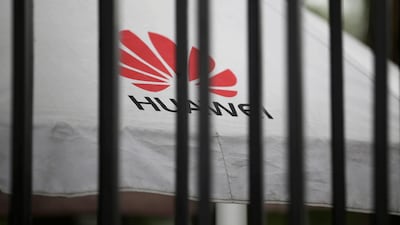China's technological advances have been highlighted by the trade stand-off with but the threat they pose will not be resolved in the current round of negotiations, a leading member of the US Senate has told the Globsec security forum in Slovakia.
Ron Johnson, the chairman of the Senate’s homeland security committee, asked participants to look beyond the current row over tariffs at the wider challenges posed by Beijing's rapid innovation in telecommunications and data.
America First, the campaign slogan that President Donald Trump has brought to the White House, is really about ensuring US autonomy and security in the digital era, Mr Johnson said.
“For every elected official their first duty is to their nation,” he said “We need to watch China in terms of their malign actions. We’re stronger [in America] by being united in demanding they comply.”
The ownership and exploitation of intellectual property and personal data was, he said, the key frontier battleground between the US and China.
“The most egregious offences aren’t going to be covered by a trade agreement,” he added. “It is the cyber theft, it is the espionage."
One focus of US efforts has been to resist the role of the Chinese firm Huawei in the roll-out of 5G networks. Huawei has become the cheapest and an increasingly dominant supplier of switching and other network technologies for the next generation telecoms systems.
“If the world embraces Huawei there are dangers,” he said. “Most of us don’t understand the real technological risks but we need to be aware of it.”
The senator also called for the US to move into a different posture to resist and deter cyber attacks. Countries that had conducted such attacks were not meeting an adequate level of retaliation.
“Those on cyber offence have got the lead, we need to strengthen cyber defences but we also need to go on the attack,” he said.
Gregory Garrett, a cybersecurity expert at the accounting and consulting firm BDO, told a separate Globsec panel that the blow back from international cyber attacks was being felt behind domestic borders. “Rogue nations states that are bad actors in the world of cyber attacks are increasingly working with organised crime,” he said.
Michael Chertoff, the former US homeland security secretary, pointed out that China was also exporting facial recognition technologies and other advanced security tools around the world in a way that was unrestrained by regulation. “The accumulation of data creates the potential for new levels of social control
and now China is inviting these countries to come and train,” he said.
Mr Chertoff added his own warning that private sector giants are also failing to provide adequate safeguards to modern societies. “The private sector don’t even really understand what happens to all the data they collect,” he said. “This has collateral consequences. Facebook are scared now but really their ability to understand what is on their platform is suboptimal."
In western societies, Mr Chertoff believes new laws are needed to ensure that encrypted data is analysed only by machines and not exploited until key tests are met. That is, "on the understanding no human being is going to access it unless you are going to meet a legal threshold, like probable cause", he said.

